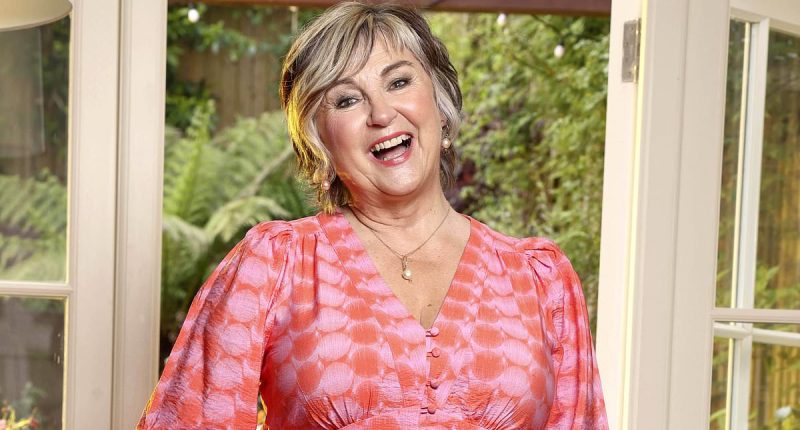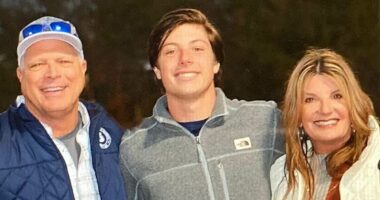Share this @internewscast.com
When thousands of people gathered to hear British opera legend Lesley Garrett perform in Bristol for an open-air gala in July last year, few could have guessed just how significant an event it was for the star.
Indeed, the Doncaster-born soprano, who has enjoyed a hugely successful 45-year singing career which has included serenading the Royal Family, performing in West End musicals and hosting her own show on Classic FM – as well as coming third on the first season of Strictly Come Dancing – likens the experience of performing that day to being ‘reborn’.
Having delighted the crowd with rousing anthems such as Rule, Britannia! and You’ll Never Walk Alone, she recalls telling the audience at the Action Aid event that she was pleased to be back after spending three months recovering from surgery.
But, as she acknowledges now, that may have been understating it just a little.
For the truth is that Lesley, who turned 70 last month, had been diagnosed with a form of cancer so rare it affects just 380 people in the UK every year – and it could have robbed her of her celebrated voice altogether.
Called a thymoma, it is a tumour on the thymus gland – a tiny organ that sits below the breastbone, just above the heart and between the lungs.
Its position is perilously close to two important nerves that control movement in the diaphragm and the voice box, so removing the tumour meant there was a small risk of permanent damage that could have left her unable to sing.
Not removing it, however, could have allowed the cancer to spread.

When thousands gathered in Bristol for an open-air gala in July last year to hear British opera legend Lesley Garrett perform, few could have known just how significant the event was for her.

The truth is that Garrett, who turned 70 last month, had been diagnosed with a form of cancer so rare it affects only 380 people in the UK each year — and it could have taken away her celebrated voice entirely

After delighting the crowd with rousing anthems such as Rule, Britannia! and You’ll Never Walk Alone, Garrett told the audience at the Action Aid event that she was pleased to be back following three months of recovery from surgery
But thanks to the skill of her NHS surgeons, and the use of high-tech robotic surgery techniques, she was breaking into song – albeit only around her house – just days after the op.
And she was back on stage, with the audience none the wiser, in just a few months.
Speaking about her ordeal for the first time, Lesley says: ‘Knowing there was a risk to my voice, that I could lose it and my career, was so terrifying – so unthinkable – that I had no choice but to lock my fears away.
‘If I’d lost the ability to sing, it would have been the end of my life, really – I’d have lost an essential part of myself. Singing isn’t just what I do, it’s who I am. I’d have lost myself, and I can’t imagine what I would have done. It would have been a kind of death.
‘But thanks to my wonderful NHS team and the cleverness of the technology I have made a full recovery and there has been no lasting effect on my voice.
‘I’m so relieved and grateful, and hope that by shining a light on a rare cancer we can raise awareness and understanding of it.’
Lesley – who lives in north London and has two children with her husband Peter Christian, a retired GP – knows only too well the devastation cancer can cause.

Lesley said: ‘Knowing there was a risk to my voice, that I could lose it and my career, was so terrifying – so unthinkable – that I had no choice but to lock my fears away.’ Pictured: Lesley Garrett with Dr James Wilson
She lost both parents to different forms of the disease – her father died of leukaemia in December 2012, and her mother followed nine months later after being diagnosed with kidney cancer that had spread to her lungs.
But it was when her sister was diagnosed with breast cancer during the early part of the pandemic that she became more ‘vigilant’ about checking herself for signs of disease.
To her surprise, she found a breast lump in autumn 2021 and was referred to the breast clinic at London’s Whittington Hospital.
But although it was found to be nothing to worry about, a scan picked up the growth on her thymus gland, which is responsible for making infection-fighting immune-system cells.
‘These are very rare tumours and most small cancer centres might only see one or two a year,’ explains oncologist James
Wilson. ‘They can behave oddly and jump around the body if they spread or recur, so it’s important to see a specialist so they know where to scan.
Symptoms generally include a persistent cough, hoarseness or a heaviness in the chest.
‘In general, most cases are, like Lesley’s, picked up incidentally when people are being investigated for something else – and if removed early, there’s an 80 to 90 per cent chance they’ll never bother you again.’

Oncologist James Wilson, pictured, explained that these are very rare tumours, with most small cancer centres seeing only one or two cases a year
When Lesley was told the lump that had been discovered was a thymoma, it was originally thought to be benign and need no treatment.
But she developed some ‘unusual vocal symptoms’ in early 2023 and she was referred to specialists at University College Hospital in central London.
‘My voice just didn’t seem to be behaving properly,’ she recalls. ‘I’d want to go for a high note and it wouldn’t do it in the same way. Something wasn’t quite right.’
Like most singers, Lesley is supremely well attuned to any vocal issues, and particularly because she had already faced a potentially career-ending crisis 20 years ago when she burst a blood vessel in her larynx during a performance with the English National Opera.
Her rehabilitation took months, and doctors only told her once it had healed that the episode could have stopped her singing for good, which she describes as ‘genuinely terrifying’.
But she had to face those fears again. While a scan appeared to suggest the thymoma had not grown, a multi-disciplinary team led by thoracic surgeon Davide Patrini recommended that she have surgery to remove the tumour and the gland itself.
For many thymoma patients this can be a major operation which involves cutting open the sternum – the breastbone – to reach the thymus underneath.
It can also be performed in some cases as a keyhole operation, which is less invasive and uses smaller incisions.

Like most singers, Garrett is highly attuned to any vocal issues — all the more so because she had previously faced a potentially career-ending crisis 20 years earlier, when she burst a blood vessel in her larynx during a performance with the English National Opera
But at some NHS hospitals, including University College Hospital, the op is increasingly being carried out with advanced surgical technology using a Da Vinci robot.
The machines, of which there are around 200 across the NHS, use tiny surgical instruments and state-of-the-art cameras on robotic arms that are inserted into the body through incisions just under 1in wide.
The surgeon sits behind a console that gives a clear view inside the patient on screens and allows control of the robotic arms.
Mr Patrini said: ‘The robotic approach has several proven benefits compared to traditional surgery, including reduced pain, faster recovery and improved surgical precision and dexterity.
‘The blood loss is minimal and patients are discharged around 30 to 40 per cent faster, often within 24 to 48 hours.’
For Lesley, this precision was particularly important. The thymus gland is close to the recurrent laryngeal nerve, which sends signals to the larynx or voice box, and the phrenic nerves, which help to control the diaphragm.
Studies suggest that up to 5 per cent of people having thymectomies – operations to remove the thymus – end up with permanent damage to these nerves, which can cause paralysis or weakness of the vocal cords.
But robotic surgery makes this less likely, Mr Patrini says.
Mr Wilson, who is overseeing Lesley’s ongoing care, explains: ‘Lots of patients in my clinic end up with a paralysed diaphragm on one side, but for Lesley to sing she needs both sides to be working properly, otherwise she would have lost a significant proportion of her singing capacity.’

For Garrett, this level of precision was particularly important. The thymus gland lies close to the recurrent laryngeal nerve, which transmits signals to the larynx or voice box, and to the phrenic nerves, which help control the diaphragm
Lesley says the team were ‘extremely careful’ to explain any possible side-effects. ‘I couldn’t bring myself to face the possibility that I’d never sing again – the idea was so terrifying I couldn’t let myself even go there. I had no choice but to put my faith in the doctors.
‘I knew they were fantastically capable, but I did say to them, ‘You will just steer clear of those nerves, won’t you dears, because I do want to have a voice.’
‘I made light of it, although the anaesthetist looked pretty shocked when he realised it was me they’d be operating on.
‘But I trusted the team, and the robot was just the most incredible kit I’ve seen in my life. I felt really privileged to have that expertise at my disposal.’
The surgery took place on March 1 last year – the day after Lesley finished a stint playing Berta in English National Opera’s production of Rossini’s The Barber Of Seville.
The two-hour operation was carried out by Kunal Bhakhri, a specialist in robotic thoracic surgery at University College Hospital, and involved deflating her right lung to allow better access into the chest cavity.
Three small incisions were made, and the instruments were inserted through the rib cage without damaging the ribs.
One robotic arm cut around the tumour and the gland, while another placed it into a surgical bag before removing it from the body to avoid ‘seeding’ any cancer cells along the way.
‘I was kept in overnight, but I was out the following morning,’ says Lesley. ‘I was back up and singing around the house in a couple of days. It was amazing.’
Tests revealed the tumour had grown and breached the thin membrane around the thymus, making it a stage-two cancer.
But the surgery had successfully removed all of it, which meant Lesley did not need to have any further radiotherapy or chemotherapy.
Instead, she must have follow-up scans every six months, which will be reduced to once a year, for the next ten to 15 years to make sure it does not come back.
These will also keep an eye on Lesley’s enlarged aorta, which was also picked up when her thymoma was diagnosed.
In the meantime, she’ll be performing alongside Russell Watson at the Proms In The Park in Bedford on July 6.
‘I can’t wait to get up there and give it my all,’ she says.
‘I received, and continue to receive, such fantastic care from the team at University College Hospital, and if talking about it helps to make this apparently rather unusual cancer better understood, then it’s my duty and privilege to do that.’















